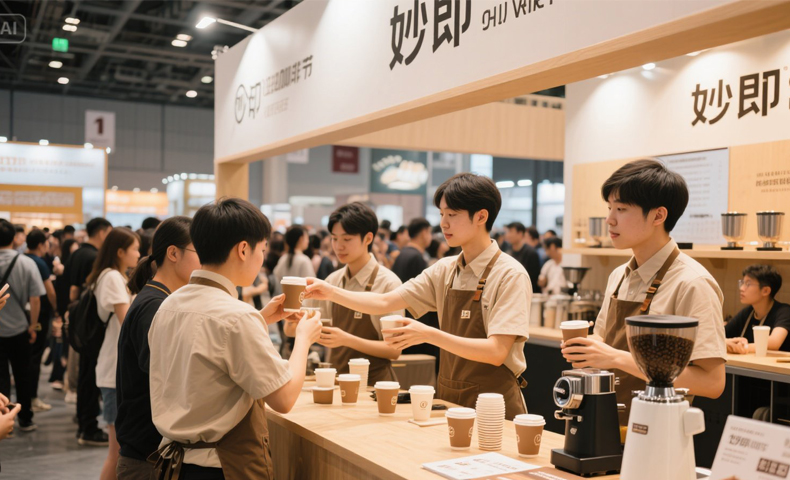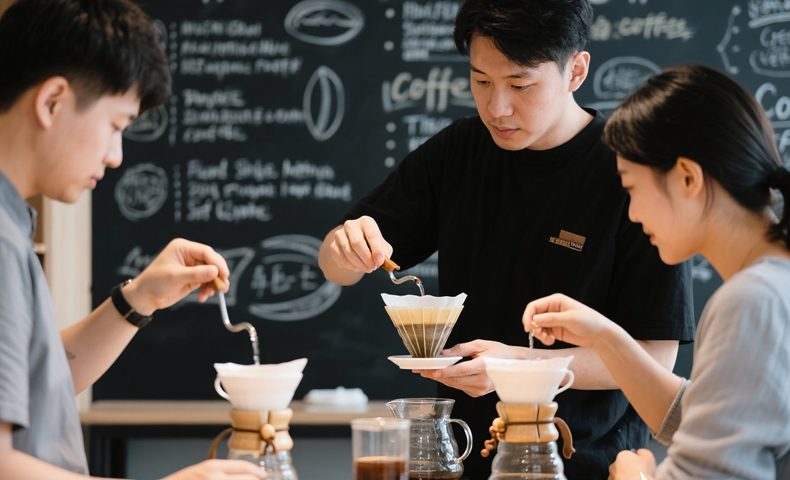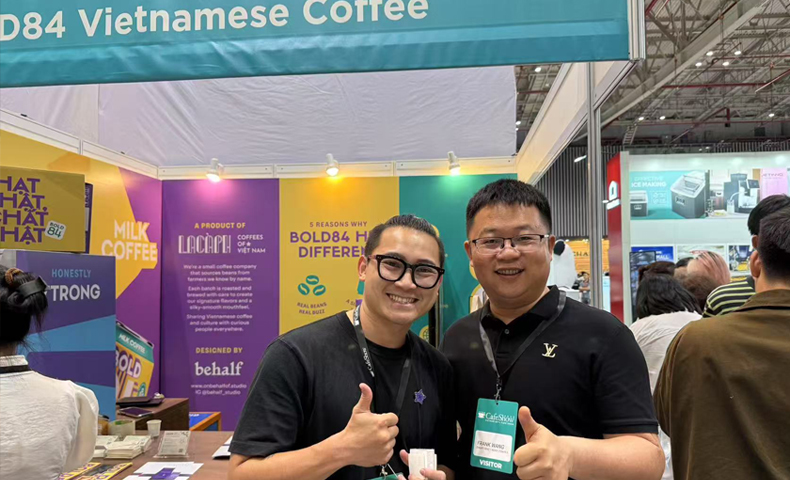How Offline Events Boost Coffee Brand Recognition
Offline events have become an essential strategy for coffee brands to build recognition and foster deeper connections with their customers. In an increasingly digital world, face-to-face interactions offer unique opportunities for brands to engage directly with their audience and stand out in the competitive coffee market. By creating immersive experiences, coffee brands can leverage offline events to cultivate brand loyalty, boost visibility, and establish a lasting presence in consumers’ minds.
This article explores how offline events can effectively enhance coffee brand recognition by allowing businesses to connect with consumers in tangible ways.
1. Why Are Offline Events Important for Coffee Brands?
Offline events offer coffee brands the chance to meet potential customers in person, fostering direct interaction that digital channels cannot fully replicate. These events provide an opportunity to showcase products, tell the brand’s story, and build personal relationships. Whether it’s a coffee festival, a product launch, or a local tasting event, face-to-face interactions create more meaningful experiences that can lead to stronger brand recognition.
Table: Benefits of Offline Events for Coffee Brands
| Benefit | Impact on Recognition | Example |
|---|---|---|
| Personal Interaction | Builds trust and emotional connections | In-person tastings that allow consumers to meet brand representatives |
| Product Showcase | Directly demonstrates product quality | Sampling stations at coffee festivals for hands-on experiences |
| Storytelling & Engagement | Communicates brand mission and values | Sharing the brand’s origin story during coffee events |
2. What Types of Offline Events Can Help Coffee Brands Gain Recognition?
There are various types of offline events that can effectively raise a coffee brand’s profile. Coffee trade shows, festivals, pop-up shops, and tasting sessions are among the most popular options. Each event type offers unique benefits, from increasing product exposure to creating memorable experiences that resonate with attendees.

Table: Types of Offline Events for Coffee Brands
| Event Type | Purpose | Benefits for Coffee Brands |
|---|---|---|
| Coffee Trade Shows | Showcase coffee products to a large audience | Networking with industry professionals and consumers |
| Pop-up Coffee Shops | Create immersive, temporary brand experiences | Build exclusivity and excitement around the brand |
| Coffee Tasting Events | Offer hands-on experience with the products | Allow customers to sample coffee and learn about its origin |
3. How Do Offline Events Help Build Personal Connections with Consumers?
Offline events offer a chance to connect on a personal level with consumers, something that is difficult to achieve through online channels alone. By engaging with customers face-to-face, brands can create memorable experiences that lead to deeper emotional connections. These personal connections build trust and loyalty, encouraging customers to share their experiences and recommend the brand to others.
Table: Building Personal Connections through Offline Events
| Connection Type | Impact on Brand Loyalty | Example |
|---|---|---|
| In-person Interaction | Creates lasting emotional bonds | Conversations at events that encourage consumers to share their brand experience |
| Demonstrations and Tastings | Allows consumers to experience products firsthand | Coffee tasting events that educate consumers on flavor profiles and brewing methods |
| Personalized Experiences | Makes customers feel valued and engaged | Customizable coffee options or workshops at live events |
4. How Can Coffee Brands Leverage Offline Events to Showcase Their Story?
Coffee brands have the opportunity to showcase their unique story through offline events. By sharing the origins of their beans, their sustainable practices, or the values that define their company, brands can connect more deeply with customers. Events allow for storytelling that not only highlights the product but also positions the brand as an authentic, trustworthy entity in the eyes of consumers.
Table: Storytelling Through Offline Events
| Storytelling Element | Impact on Consumer Perception | Example |
|---|---|---|
| Brand History and Origins | Builds authenticity and trust | Sharing the journey of coffee from farm to cup during tasting events |
| Sustainability Practices | Aligns the brand with consumer values | Promoting eco-friendly sourcing at eco-conscious coffee festivals |
| Social Responsibility | Establishes a strong connection with consumers | Highlighting the brand’s charity work or fair trade practices during product showcases |
5. What Are the Benefits of Sampling and Product Demonstrations at Offline Events?
Product sampling is one of the most effective ways to build recognition and encourage purchases. Coffee brands can use offline events to let consumers taste the product before making a decision. Providing samples or live demonstrations of coffee brewing techniques allows brands to showcase the quality of their product, while giving consumers the chance to experience it firsthand. This can significantly impact the likelihood of purchase.
Table: Benefits of Product Sampling at Events
| Benefit | Impact on Consumer Behavior | Example |
|---|---|---|
| First-Hand Experience | Builds trust in product quality | Offering small tastings of different coffee blends at a coffee festival |
| Increased Product Awareness | Expands the audience’s understanding of the product | Demonstrating various brewing methods and their results at a live event |
| Immediate Consumer Feedback | Provides insight into customer preferences | Collecting opinions on flavors and packaging at a product booth |
6. How Do Offline Events Help Coffee Brands Stand Out in a Competitive Market?
In an overcrowded market, standing out is crucial. Offline events provide an opportunity for coffee brands to differentiate themselves through unique packaging, customer experiences, or interactive activities. Creating memorable events helps brands establish their identity and gain recognition, both during the event and long after it’s over. By hosting exclusive events, coffee brands can make their products seem more desirable.

Table: Standing Out in a Competitive Market through Offline Events
| Differentiation Strategy | Impact on Brand Recognition | Example |
|---|---|---|
| Exclusive Events | Creates urgency and excitement | Hosting limited-access tasting events with special offerings |
| Unique Event Features | Enhances the brand’s appeal | Hosting workshops that teach consumers how to brew the perfect cup of coffee |
| Eye-catching Brand Presence | Grabs attention in a crowded market | Creating an unforgettable visual display at a coffee trade show |
7. How Can Coffee Brands Use Offline Events to Collect Valuable Consumer Feedback?
Offline events offer coffee brands a direct line to consumer feedback. Engaging with customers in person allows for immediate responses to questions, concerns, and product preferences. Collecting feedback at these events helps brands refine their products, packaging, and marketing strategies, ensuring they align with consumer demands and expectations.
Table: Collecting Consumer Feedback at Offline Events
| Feedback Method | Impact on Brand Improvement | Example |
|---|---|---|
| Surveys and Polls | Gathers insights into consumer preferences | Conducting short surveys at a tasting event to gauge opinions on flavors |
| One-on-One Conversations | Provides deeper understanding of customer needs | Engaging customers in dialogue at events to learn more about their preferences |
| Product Testing | Helps identify areas for improvement | Offering different product variations at events to see which one performs better |
8. How Do Offline Events Increase Local and Global Brand Visibility?
Offline events are powerful tools for increasing both local and global visibility. Local events like farmer’s markets or city-wide coffee festivals introduce the brand to a local audience, while global events expand the brand’s reach internationally. By participating in or sponsoring global coffee festivals, a brand can showcase its products to a diverse, worldwide audience, increasing its potential for international growth.
Table: Increasing Brand Visibility through Offline Events
| Event Type | Impact on Brand Visibility | Example |
|---|---|---|
| Local Events | Increases brand awareness within the community | Participating in local coffee festivals to introduce the brand to neighborhood consumers |
| Global Events | Expands reach to international markets | Sponsoring or attending global coffee events to attract international distributors |
| Regional Partnerships | Enhances visibility through collaboration | Collaborating with local cafes for event sponsorship or co-branding |
9. How Can Coffee Brands Use Offline Events to Network and Build Partnerships?
Offline events serve as valuable networking opportunities for coffee brands. By participating in industry events, brands can connect with suppliers, distributors, and other industry professionals, leading to potential business partnerships. These connections can be instrumental in expanding a brand’s reach and fostering long-term business relationships. Whether through collaborations or co-marketing initiatives, offline events create a platform for coffee brands to build strategic partnerships.

Table: Networking and Building Partnerships through Offline Events
| Networking Opportunity | Impact on Brand Growth | Example |
|---|---|---|
| Meeting Industry Professionals | Opens doors for collaboration and growth | Connecting with coffee roasters and suppliers at trade shows |
| Collaborative Partnerships | Expands brand exposure through co-marketing | Partnering with a local cafe for an event, increasing visibility |
| Supplier Relations | Ensures reliable sourcing and supply chain | Engaging with new suppliers at industry expos to diversify sourcing |
10. What Are the Key Marketing Strategies for Promoting Coffee at Offline Events?
To make the most of offline events, coffee brands need to implement effective marketing strategies. Pre-event promotion through social media, email newsletters, and influencer partnerships helps create anticipation. During the event, interactive experiences like tastings and giveaways can keep attendees engaged. After the event, following up with attendees through personalized emails or exclusive offers helps maintain the relationship and convert leads into customers.
Table: Marketing Strategies for Coffee Brands at Offline Events
| Marketing Strategy | Purpose | Example |
|---|---|---|
| Pre-event Promotion | Build anticipation and drive event attendance | Social media campaigns and email invites featuring event details |
| Interactive Experiences | Engage attendees and encourage product trials | Coffee sampling stations, live brewing demos, and barista competitions |
| Post-event Follow-up | Convert leads into loyal customers | Sending thank-you emails with discount codes or event highlights |
11. How Can Coffee Brands Measure the Success of Their Offline Events?
To assess the effectiveness of offline events, coffee brands need to track key performance indicators (KPIs). These might include the number of attendees, the volume of sales during or after the event, and the amount of media coverage or social media buzz generated. Surveys or feedback forms can also provide valuable insights into how well the event was received by the audience. By analyzing these metrics, brands can determine the return on investment (ROI) of their offline events and refine their strategies for future events.
Table: Measuring Offline Event Success
| KPI | Purpose | Example |
|---|---|---|
| Event Attendance | Gauges interest and engagement | Tracking the number of attendees compared to initial event goals |
| Sales During and After Event | Measures direct impact on revenue | Comparing sales figures before, during, and after the event |
| Social Media Mentions | Measures brand awareness and online engagement | Tracking the number of mentions, likes, shares, and hashtags used related to the event |
12. What Role Does Event Design and Atmosphere Play in Brand Recognition?
The design of an offline event can significantly impact how the brand is perceived. An event that is visually appealing, well-organized, and reflective of the brand’s identity leaves a lasting impression on attendees. The atmosphere—whether it’s cozy and welcoming or energetic and exciting—should align with the brand’s values. A well-designed space or booth encourages visitors to stay longer, learn more about the brand, and ultimately feel more connected to it.
Table: Event Design and Its Impact on Brand Recognition
| Event Design Element | Impact on Brand Perception | Example |
|---|---|---|
| Visual Branding | Reinforces brand identity and recognition | Using the brand’s signature colors and logos in booth designs |
| Atmosphere and Environment | Sets the mood and tone for brand interaction | Creating a relaxed, welcoming environment with comfortable seating for guests |
| Interactive Design Features | Increases engagement and time spent at the booth | Installing a coffee-making station where consumers can participate in the brewing process |
13. How Can Coffee Brands Use Offline Events to Increase Sales?
Offline events provide an immediate opportunity for coffee brands to boost sales. Offering exclusive deals, discounts, or limited-edition products during the event can drive purchases. By creating a sense of urgency and scarcity, brands can encourage attendees to make a purchase on the spot. Additionally, capturing attendee information for post-event follow-up can turn leads into long-term customers, leading to sustained sales growth.
Table: Increasing Sales Through Offline Events
| Sales Strategy | Impact on Revenue | Example |
|---|---|---|
| Exclusive Discounts | Encourages immediate purchases | Offering event-only discounts on popular coffee blends |
| Limited Edition Products | Creates urgency and exclusivity | Launching a special edition coffee only available at the event |
| Lead Capture for Post-event Sales | Ensures continued engagement and sales growth | Collecting emails for future promotions and event reminders |
14. How Do Coffee Brands Handle Logistics and Costs at Offline Events?
Organizing offline events involves significant logistical considerations, including event setup, staffing, travel, and product supply. Managing these elements efficiently is key to ensuring the event runs smoothly and stays within budget. While hosting or participating in an event can be costly, brands can mitigate expenses by partnering with other businesses, leveraging in-kind sponsorships, or choosing cost-effective venues. Effective planning and resource allocation are essential to achieving a high ROI.
Table: Handling Logistics and Costs at Offline Events
| Logistical Consideration | Impact on Event Execution | Example |
|---|---|---|
| Budget Management | Ensures the event is cost-effective | Planning a budget that includes all expenses and potential income sources |
| Staffing and Travel | Provides smooth event operations | Hiring local staff to reduce travel expenses and ensure seamless event coordination |
| Venue Selection | Affects event reach and costs | Choosing a local venue for lower costs and greater community engagement |
15. How Do Coffee Brands Utilize Offline Events for Market Expansion?
Offline events allow coffee brands to test new markets and expand their customer base. By attending international coffee festivals or hosting regional pop-up shops, brands can gauge consumer interest in new areas before fully committing to new markets. These events also provide valuable data on consumer preferences, helping brands refine their product offerings and marketing strategies to meet the needs of different regions.
Table: Expanding into New Markets through Offline Events
| Market Expansion Strategy | Impact on Market Reach | Example |
|---|---|---|
| International Event Participation | Opens doors to global markets | Attending international coffee festivals to reach global consumers |
| Regional Pop-up Shops | Tests market response in new locations | Setting up temporary coffee shops in new cities to evaluate consumer demand |
| Data Collection from Attendees | Provides insights into regional preferences | Gathering feedback from event-goers to tailor products to local tastes |
FAQ Section
Q1: What are offline events in the context of coffee brands?
Answer: Offline events refer to physical gatherings or activities where coffee brands interact directly with their customers. These include trade shows, coffee festivals, pop-up shops, and tastings, offering brands a chance to showcase their products and build relationships with consumers.
Q2: How do offline events help coffee brands build personal connections with customers?
Answer: Offline events allow coffee brands to meet consumers face-to-face, fostering direct relationships. These personal interactions create trust, enhance brand loyalty, and help brands better understand customer needs and preferences.
Q3: Can offline events lead to increased sales for coffee brands?
Answer: Yes, offline events can drive immediate sales through promotions, product demonstrations, and exclusive discounts. Additionally, capturing attendee contact information helps in post-event marketing, converting leads into long-term customers.
Q4: What role does event design play in a coffee brand’s success at offline events?
Answer: The design of an event space significantly impacts the customer experience and brand perception. A well-designed booth that reflects the brand’s identity and engages consumers can increase the time spent at the event and enhance brand recognition.
Q5: How can coffee brands measure the success of their offline events?
Answer: Coffee brands can measure success through metrics such as event attendance, sales during and after the event, social media engagement, and consumer feedback. Tracking these KPIs helps evaluate the event’s ROI and refine future event strategies.
